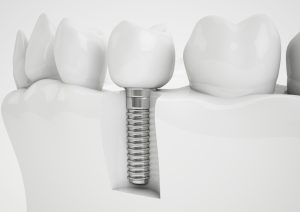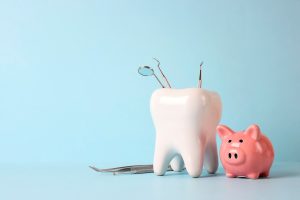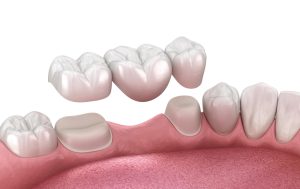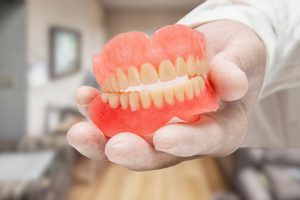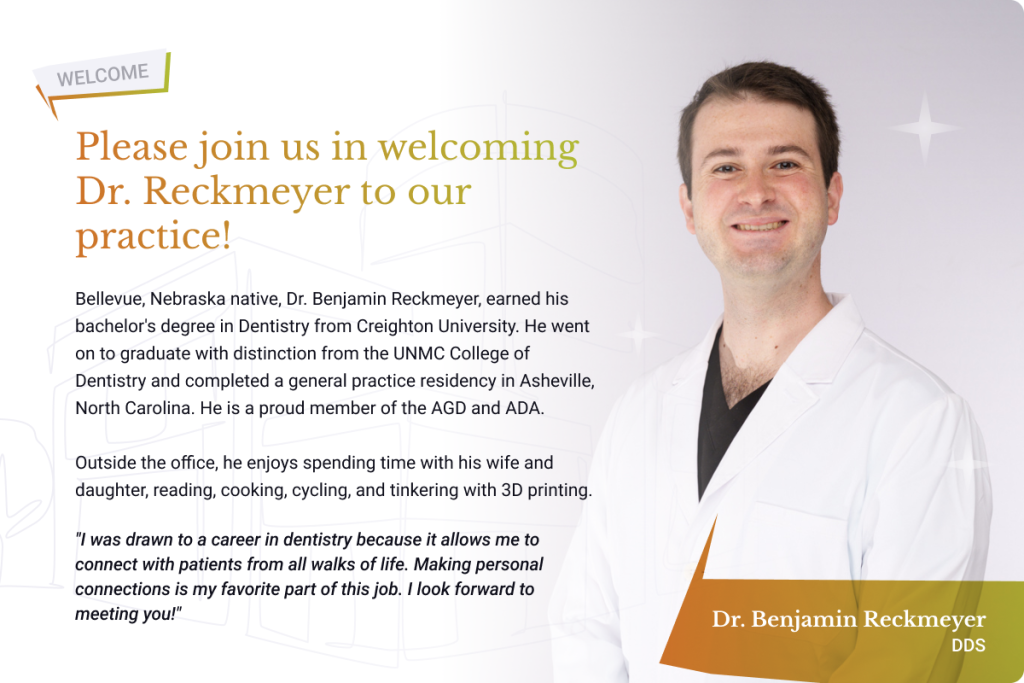Know Your Tooth Replacement Options
When it comes to replacing missing teeth, there are multiple options available to patients. The most common options include dental implants, dentures, and dental bridges. Each treatment plan has its pros and cons, and the best choice will depend on the patient’s needs, goals, and circumstances.
Our Manhattan implant dentists offer various tooth replacement options. Contact Downtown Dental Group, your local Manhattan, KS, dental practice by calling (785) 776-0097 to learn more about your tooth replacement options.
Dental Implants
Dental implants are artificial tooth roots surgically placed into the jawbone to support replacement teeth. They offer several advantages:
- Long-lasting Solution: Dental implants can last a lifetime with proper care.
- Natural Look and Feel: They function and appear like natural teeth.
- Bone Preservation: Dental implants help prevent bone loss in the jaw.
- No Damage to Adjacent Teeth: Unlike bridges, dental implants don’t require altering healthy teeth.
However, dental implants also have some drawbacks:
- Higher Upfront Cost: Dental implants are typically more expensive than other options.
- Surgical Procedure: Dental implants require surgery and a longer healing period.
- Not Suitable for Everyone: Patients need adequate bone density and good overall health.
Dentures
Dentures are a traditional option for replacing missing teeth. They consist of a set of artificial teeth mounted on a removable acrylic base that fits over the gums. Dentures are a good option for patients missing most or all of their teeth, as they can replace an entire arch. They’re also relatively inexpensive and made quickly.
However, dentures can be uncomfortable and may not fit well, causing irritation and soreness. They can also slip and move around in the mouth, making it difficult to eat and speak.
Depending on the patient’s dental needs alone, there are multiple denture options available, including:
- Full dentures, also known as complete dentures. These replace all teeth in either the upper or lower jaw, utilizing suction and adhesives for stability.
- Partial dentures, also known as removable bridges, attach to remaining natural teeth using metal clasps or precision attachments to replace specific missing teeth.
- Implant-supported dentures are a more permanent alternative to traditional dentures. These combine traditional denture design with the stability of dental implants, offering improved retention and comfort.
Dental Bridges
A dental bridge is a tooth replacement anchored in place by the teeth on either side of the gap. A bridge is typically made of porcelain or ceramic and is custom-made to fit the patient’s mouth. They’re good options for patients who are missing one or a few teeth and have healthy teeth on either side of the gap. Dental bridges are less expensive than dental implants, but they do require healthy teeth to be altered to support the bridge.
Additional Considerations
Insurance Coverage
Dental bridges are more likely to be covered by insurance than dental implants. Dentures are also often covered, while dental implants may require out-of-pocket expenses. It’s important to check with your insurance provider to understand your coverage.
Maintenance Requirements
- Dental Implants: Easiest to maintain; brush and floss like natural teeth.
- Dentures: Require daily cleaning and removal at night.
- Bridges: Need special flossing techniques and regular cleaning.
Impact on Surrounding Teeth
- Dental Implants: No impact on adjacent teeth.
- Bridges: Require altering healthy adjacent teeth for support.
- Dentures: May put pressure on remaining natural teeth.
Candidacy Factors
- Dental Implants: Ideal for those with good overall health and adequate bone density.
- Dentures: Suitable for most patients, including those with significant tooth loss.
- Bridges: Best for those with healthy teeth adjacent to the gap.
Is Doing Nothing an Option?
Doing nothing is technically an option when it comes to missing teeth, but it’s generally not recommended for several reasons:
- Missing teeth can cause several problems for the remaining teeth and the jawbone. When a tooth is missing, the surrounding teeth can shift to fill the gap, leading to misalignment and bite problems.
- Additionally, the jawbone can shrink and deteriorate if it’s not supporting a tooth, causing the face to appear sunken and aged.
- Lost teeth can make it difficult to chew and speak properly. This can lead to trouble eating certain foods and speaking clearly, affecting the quality of life.
- Missing teeth can harm self-esteem and social interactions. People may feel self-conscious about their appearance and avoid smiling or speaking in public.
In light of these issues, it’s recommended to consider tooth replacement options such as dental implants to restore function and aesthetics, and improve overall oral health.
Cost Information
The cost of tooth replacement varies significantly depending on the chosen method and individual circumstances. Dental implants typically range from $3,000 to $4,500 per single tooth implant, including the crown and all procedures.
The costs of full-mouth dental implants can range from $20,000 to $45,000 per arch. Traditional dentures are generally the most affordable option, with complete dentures ranging from $1,000 to $3,000 per arch. Partial dentures typically cost between $700 and $1,800. Dental bridges fall in the middle range, with a typical three-unit bridge costing between $2,000 and $5,000.
These costs can be affected by:
- Geographic location and local market rates
- The complexity of your case
- Additional procedures needed (such as bone grafting)
- Materials chosen
- Experience level of the dentist
Success Rates and Longevity
Dental implants show the highest success rate among tooth replacement options, with a 95-98 percent success rate when implant treatment is performed by experienced professionals. Traditional bridges have a success rate of approximately 80-85 percent after ten years, while dentures don’t typically have measured success rates but rather focus on fit and functionality metrics.
Expected lifespan for each option:
- Dental Implants: Dental implants can last 25 years to a lifetime with proper care.
- Dental Bridges: Bridges can usually last five to 15 years.
- Dentures: Dentures usually last five to eight years before needing replacement.
- Implant-supported dentures: These restorations can last 10-15 years for the denture portion, and a lifetime for dental implants.
Recovery and Healing Timeline
Understanding the recovery process helps set realistic expectations for your tooth replacement journey. Each option has a unique timeline and set of considerations.
For Dental Implants:
- Initial Healing: Soft tissue recovery typically takes seven to 14 days. During this time, patients may experience swelling, bruising, and mild discomfort.
- Osseointegration Period: This crucial phase in the dental implant process lasts three to six months, during which the implant fuses with the jawbone.
- Treatment Duration: The entire dental implant process usually involves multiple appointments spread over three to eight months, depending on individual cases and healing rates.
- Initial Discomfort: Patients can expect swelling and discomfort for the first three to five days post-surgery. Pain medication and ice packs are often recommended during this period of dental implant treatment.
- Dietary Restrictions: A soft food diet is typically recommended for the first six to eight weeks to protect the dental implant site and promote healing.
For Dental Bridges:
- Initial Adjustment: Patients usually require one to two weeks to fully adjust to their new bridge.
- Recovery Time: Minimal recovery time is needed compared to implants, as the procedure is less invasive.
- Sensitivity: Temporary sensitivity in the treated area may last for one to three weeks.
- Diet: Most patients can resume a normal diet within days of getting their bridge.
For Dentures:
- Adjustment Period: The initial adjustment to new dentures typically takes two to four weeks.
- Speech Adaptation: Patients often need one to two weeks to adapt their speech patterns with their new dentures.
- Eating Adaptation: It usually takes three to four weeks for patients to become comfortable eating with their new dentures.
- Follow-up Appointments: Multiple adjustment appointments may be needed in the first few months to ensure proper fit and comfort.
Specific Complications and Risk Factors
Each tooth replacement option carries specific risks that patients should understand before making a decision.
Dental Implants
- Dental Implant Failure (2-5% risk): Failure can occur due to poor osseointegration, infection, or overloading.
- Infection Around Implant Site: This can lead to peri-implantitis, a form of periodontal disease that can cause bone loss and implant failure if left untreated.
- Nerve Damage (rare): Can cause pain, discomfort, numbness, or tingling in the lips, tongue, or chin.
- Sinus Complications in Upper Jaw Dental Implants: May occur when dental implants in the upper jaw protrude into the sinus cavities.
- Peri-implantitis Risk: A form of gum disease around dental implants that can lead to bone loss and implant failure if not addressed.
Dental Bridges
- Decay in Supporting Teeth: Plaque accumulation under crowns can lead to decay, potentially requiring bridge replacement.
- Root Canal Need in Supporting Teeth: Damage to adjacent teeth during bridge placement may necessitate root canal treatment.
- Bridge Failure Due to Structural Stress: Improper fitting or misalignment can cause damage to the bridge or supporting teeth.
- Food Trapped Underneath: Can lead to decay and gum disease if not properly cleaned.
- Gum Disease Around The Bridge: Difficult-to-clean areas can foster bacterial growth, potentially leading to gum disease.
Dentures
- Bone Loss In The Jaw Over Time: Lack of stimulation to the jawbone can lead to bone resorption.
- Sore Spots and Irritation: Ill-fitting dentures can cause discomfort and irritation to the gums.
- Changes in Fit Requiring Adjustments: As the jaw shape changes, dentures may need frequent adjustments.
- Speech Difficulties: Particularly common during the initial adjustment period.
- Reduced Taste Sensation: Full upper dentures can cover the palate, affecting taste perception.
- Gagging Reflex Issues: Some patients may experience a heightened gag reflex, especially with full upper dentures.
Diet and Lifestyle Impact
Different tooth replacement options affect your eating habits and lifestyle in various ways.
Dental Implants
- Most Similar to Natural Teeth: Provide a natural feel and function.
- No Food Restrictions After Healing: Patients can eat a wide variety of foods without limitations.
- Normal Bite Force Restored: Allows for comfortable biting and chewing of most foods.
- Can Eat Sticky, Hard, and Chewy Foods: No special considerations are needed for most food types.
- No Special Cleaning Beyond Normal Oral Hygiene: Brush and floss like natural teeth.
Dental Bridges
- Avoid Extremely Hard Foods: To prevent damage to the bridge structure.
- Careful With Sticky Foods: These can potentially dislodge the bridge.
- Special Flossing Techniques Required: Use floss threaders or interdental brushes to clean under the bridge.
- May Need to Cut Food Into Smaller Pieces: To reduce stress on the bridge and make chewing easier.
- Avoid chewing Ice or Hard Candy: These can damage the bridge or supporting teeth.
Dentures
- Start With Soft Foods and Gradually Increase Texture: Allows for adjustment to chewing with dentures.
- May Need to Avoid:
- Very Sticky Foods: Can dislodge dentures.
- Hard Nuts and Seeds: Difficult to chew and may damage dentures.
- Tough Meats: Can be challenging to chew effectively.
- Whole apples and corn on the cob: May dislodge dentures.
- Remove and Clean After Meals: Necessary for proper hygiene and to prevent odors.
- May Affect Taste and Temperature Sensation: Particularly with full upper dentures covering the palate.
Frequently Asked Questions
Certain health conditions can affect your suitability for dental implants. For example, patients with uncontrolled diabetes, severe periodontal disease, or those who smoke heavily may be at higher risk for implant failure.
Additionally, individuals with insufficient jaw bone density or those undergoing radiation therapy in the jaw area might not be ideal candidates for dental implants. In such cases, bridges or dentures might be more suitable alternatives. A thorough evaluation by a dentist will help determine whether implant surgery is the best option based on your health status.
Dental implants generally have minimal impact on taste sensation, as they don’t cover the palate or other areas of the mouth associated with taste. Full dentures, especially those covering the upper palate, can significantly affect taste perception.
Bridges have less impact on taste than full dentures but may still affect it to some degree. Dental implants provide the most natural experience in terms of preserving taste sensations.
Dental implants offer more flexibility for future upgrades compared to traditional options. As dental implant placement technology advances, the crown or prosthetic attached to the implant can often be upgraded without disturbing the implant itself.
This allows patients to benefit from new materials or aesthetic improvements. Bridges and dentures typically require complete replacement to incorporate new technologies or materials, making it more challenging to take advantage of future advancements.
The dental implant placement process typically takes several months, including healing and osseointegration. Bridges and dentures can often be completed in a few weeks. However, dental implants offer a long-term solution that may require less frequent replacement or adjustment compared to other options.
Discover the Best Tooth Replacement for You, Call Now!
While dental implants are often considered the gold standard for replacing teeth, we know they may not be right for everyone. Each tooth replacement option has its own set of benefits and considerations. The best choice depends on your individual needs, oral health, budget, and long-term goals.
Scheduling a consultation with our Manhattan dental professionals will help you understand which dental care option is best for your specific needs and circumstances. During your visit, we’ll conduct a thorough examination, discuss your goals, medical history, and dental insurance, and provide personalized dental restoration recommendations to help you make an informed decision about your dental health.
Contact Downtown Dental Group today at (785) 776-0097 to schedule your consultation and take the first step towards a complete, healthy smile.

